Online reputation management has become an important part of local business operations these days, with nearly 98% of consumers reading reviews before making a purchase. Despite the abundance of online reputation management tools available, selecting the right one for your business can be challenging.
In this article, we'll explore how to identify the best reputation management tool to attract new customers and boost your conversion rate, ensuring your business maintains a positive online presence.
How does the booking process of guests changed in the last decades?
Online Reputation Management (ORM) is crucial for local businesses like hotels or restaurants. The modern guest journey often begins on platforms like Google, Yelp, Booking or Tripadvisor, where ratings and reviews significantly impact a company's visibility and attractiveness. Maintaining a positive online image through proactive ORM strategies, such as monitoring reviews, is essential to mitigate negative feedback and enhance positive brand perception.
A strong online presence, characterized by high ratings and positive reviews, can significantly boost a company's appeal and drive more customer engagement. Embracing these digital solutions ensures businesses can maintain a positive reputation, improve customer satisfaction, and attract more clients.
What are the 3 elements of measuring online reputation?
Measuring online reputation may be tricky, but there are definitive factors that drive your online reputation and therefore sales:
1. Review Rating
Review ratings are a critical component of your online reputation, reflecting customer satisfaction and service quality. Higher ratings generally indicate a positive perception of your brand that drive trust, while lower ratings highlight areas needing improvement. According to a BrightLocal survey, consumers prefer businesses with at least a 4-star rating, with 3.5 stars being the minimum acceptable rating. In fact, star ratings are often the first criterion determining whether a business falls into the consideration set for potential customers.
Essentially, a company's online reputation is closely tied to its star ratings on key review platforms, making it imperative to understand and manage these ratings effectively. For more insights, refer to our article, "Understanding the ROI of Online Review Ratings: Metrics, KPIs, and More."
2. Number of reviews
The number of reviews and its recency are crucial metrics in measuring the online reputation. A high volume of reviews indicates that customers are actively engaging with your company, providing valuable feedback. This metric helps gauge the level of interest and interaction with your business.
Additionally, a larger number of reviews can enhance credibility and trust among potential customers, as it reflects a more comprehensive and balanced view of customer experiences. Monitoring the quantity of reviews over time also helps identify trends and patterns, enabling businesses to understand their reputation trajectory and make informed decisions.
Our article, "How to Collect Reviews and Elevate Your Brand's Image" delves into the significance of having a high number of reviews and how to harness their potential to enhance your brand's reputation.
3. Sentiment analysis
Sentiment analysis evaluates the tone of online mentions, categorizing them into positive, neutral, and negative:
- Positive sentiment: Shows customer satisfaction and loyalty, boosting your brand's image.
- Neutral sentiment: Includes factual statements or questions, offering opportunities for engagement.
- Negative sentiment: Highlights dissatisfaction, crucial for addressing issues promptly.
Sentiment analysis helps prioritize responses, ensuring negative issues are managed and positive interactions are amplified.

What are the signs that a business has a good online reputation?
Merely having an abundance of mentions or reviews does not guarantee a favorable online reputation. Instead, a business with a positive online reputation often demonstrates several distinct indicators:
a. High review rating
A high review rating, such as 4 stars or above, reflects overall customer satisfaction and quality of service. Consistently high ratings indicate that the majority of customers have positive experiences, enhancing the business's credibility and attractiveness to potential customers.
To learn more about how you can leverage your listing’s high review rating, read our article "How Ratings and Reviews Impact Search."
b. Large number of relevant reviews
A large number of relevant reviews suggests widespread customer engagement and trust in the business. Potential customers are more likely to visit a business with many reviews as it provides a broader perspective of customer experiences. For example, a restaurant with 4.5 stars and 300 reviews is generally perceived as more trustworthy than one with 4.5 stars but only 30 reviews.
Discover how Google determines the most relevant reviews for your business in our article "Understanding Google's Most Relevant Reviews: What's the Criteria?"
c. Consistent flow of recent reviews
A steady stream of recent reviews indicates ongoing customer activity and satisfaction. It shows that the business is continuously attracting and engaging customers, keeping its online reputation current and relevant. Recent reviews also help potential customers make informed decisions based on the latest feedback.
d. Active engagement and interaction
Active engagement with customers across online platforms is a hallmark of a strong online reputation. This includes promptly responding to reviews and inquiries, as well as fostering meaningful interactions that showcase a dedication to customer satisfaction and responsiveness.
Learn why you should reply to every review and how it can help your business in our article The Importance of Responding to Reviews Individually.
e. Minimal and addressed negative feedback
While negative feedback is inevitable, businesses with a good online reputation typically have a low volume of negative reviews. Moreover, they demonstrate effective management of criticisms or complaints by addressing concerns promptly and transparently. This proactive approach helps mitigate the impact of negative feedback and maintains overall trust and credibility with customers.

What is an online reputation management tool?
An online reputation management (ORM) tool is a software solution designed to help businesses monitor, manage, and influence their online presence. It aggregates and analyzes data from various online sources, such as online listings and review sites, to provide insights into how a business is perceived by other guests. These tools often feature sentiment analysis, review monitoring, and automated response capabilities to help businesses maintain a positive online reputation and address negative feedback promptly.
For instance, a hotel can use an ORM tool to respond quickly to negative reviews and highlight positive ones. By doing so, the hotel can improve its overall review rating and attract more guests, demonstrating the critical role of ORM tools in determining business success.
With its myriad benefits, businesses are increasingly turning to an online reputation management software to enhance their revenue generation. Therefore, it's no surprise that the ORM software market size is soaring. In 2022, the market was estimated at $175 million, and it's projected to reach $585 million by the end of 2030.
What are the pros and cons of Online Reputation Management Systems?
Online Reputation Management (ORM) systems offer businesses a range of advantages and disadvantages. Understanding these pros and cons is crucial for making informed decisions about implementing ORM strategies.
Pros:
- Enhanced brand image: ORM systems allow businesses to actively monitor and manage their online reputation, helping to cultivate a positive brand image. By addressing negative feedback promptly and highlighting positive reviews, businesses can improve customer perception and loyalty.
- Efficient monitoring: ORM tools streamline the process of monitoring online mentions across various platforms. Centralized dashboards provide real-time insights, enabling businesses to stay informed about customer feedback and address issues promptly.
- Time and resource savings: Automated features, such as sentiment analysis and response generation, save businesses time and resources. Instead of manually tracking and analyzing online mentions, businesses can rely on ORM tools to streamline these processes efficiently.
- Competitive advantage: Maintaining a positive online reputation can give businesses a competitive edge in crowded markets. By actively managing their reputation, businesses can differentiate themselves from competitors and attract more customers.
- Empower in-house or outsourced ORM experts: ORM systems empower in-house or outsourced ORM experts to make informed decisions and take proactive measures to safeguard the brand's reputation. These professionals can leverage the data and insights provided by ORM tools to develop effective strategies and initiatives for reputation management.
Cons:
- Risk of misinterpretation: Automated sentiment analysis may not always accurately capture the nuances of customer feedback. Misinterpreting sentiment can lead to inappropriate responses or missed opportunities for engagement.
- Over-reliance on technology: While ORM tools offer valuable insights, businesses must avoid overreliance on technology. Human judgment and intervention are still necessary to address complex issues and build genuine relationships with customers.
- Cost of implementation: High-quality ORM systems can be costly to implement, especially for small businesses with limited budgets. Additionally, ongoing subscription fees and maintenance costs can add up over time.
- Limited Control over online conversations: Despite proactive reputation management efforts, businesses have limited control over online conversations. Negative reviews and comments can still impact brand perception, requiring continuous monitoring and mitigation efforts.
What are the features of a good reputation management system?
A good reputation management system encompasses several key features that enable businesses to effectively monitor, analyze, and manage their online reputation. These features include:
a. AI integration
Incorporating artificial intelligence (AI) capabilities allows reputation management systems to automate processes such as sentiment analysis, response generation, and trend identification. AI integration enhances efficiency and accuracy, enabling businesses to proactively address issues and capitalize on opportunities in real time. A great feature to look for is AI-driven review response generation, which ensures timely, personalized, and consistent replies to customer feedback. This not only saves time but also maintains a high level of engagement with customers, improving overall customer satisfaction and loyalty.
According to the latest data, 35% of global companies report using AI in their business. Furthermore, in our 2024 research, we found that 1 out of 3 hoteliers saves more than 3 minutes through AI review replies
b. Review monitoring
A comprehensive review monitoring centralizes all online reviews from various platforms. This feature provides businesses with a holistic view of their online reputation, allowing them to track trends, identify patterns, and respond promptly to guest feedback.
Integrating Google into your ORM software should be a top priority, given that Google Maps alone has the potential to influence 93% of today's consumer base.
c. Sentiment analysis
Advanced sentiment analysis capabilities enable reputation management systems to evaluate the tone and context of customer reviews. By categorizing sentiment as positive, negative, or neutral, businesses can gauge overall customer satisfaction levels and identify areas for improvement.
d. Customizable reporting
Currently, 59% of businesses are harnessing data analytics to enhance decision-making and boost business performance, incorporating data from their online mentions and reviews. A quality reputation management system should provide customizable reporting features, empowering businesses to generate detailed insights and metrics customized to their unique requirements. These customizable reports enable businesses to monitor key performance indicators (KPIs), evaluate the effectiveness of reputation management endeavors, and make informed, data-driven decisions to strengthen their online reputation.
e. Competitor benchmarking
Incorporating competitor benchmarking capabilities allows businesses to compare their online reputation performance against industry peers and competitors. By analyzing competitor metrics such as review ratings, sentiment analysis, and online engagement, businesses can identify competitive strengths and weaknesses and adjust their strategies accordingly.
In summary, a good online reputation management tools should include features such as the ability to monitor reviews on major review sites, respond to customer feedback, and analyze customer sentiment. Read our article “Online Reputation Management for Hotels - All You Need to Know” to learn more about these features.
What is the best online reputation management software?
Choosing the right online reputation management software is crucial for maintaining and enhancing your business's digital presence. Here are some of the top ORM systems in the market today:
1. MARA AI
Responding to online reputaiton management can be a daunting task, but it doesn't have to be with our AI Review Assistant of MARA. This intuitive tool is designed to ease your Online Reputation Management process, making it more efficient, personalized, and time-saving. It offers the best and most personalized AI for responding to and analyzing your guest reviews.
Streamlined Review Inbox
One of the key features of this tool is the Review Inbox. Your review inbox makes responding to reviews as simple as hitting "Generate reply" and clicking "Send". The Review Inbox connects to multiple review sources, including Google, Booking.com, and Tripadvisor, giving you a panoramic view of all your reviews. And you can even configure review response automation: Why not allow MARA to automatically respond to simple reviews, like 5-star Google reviews with no text, ensuring you never miss a review? Daily notifications about new reviews keep you updated and in control.
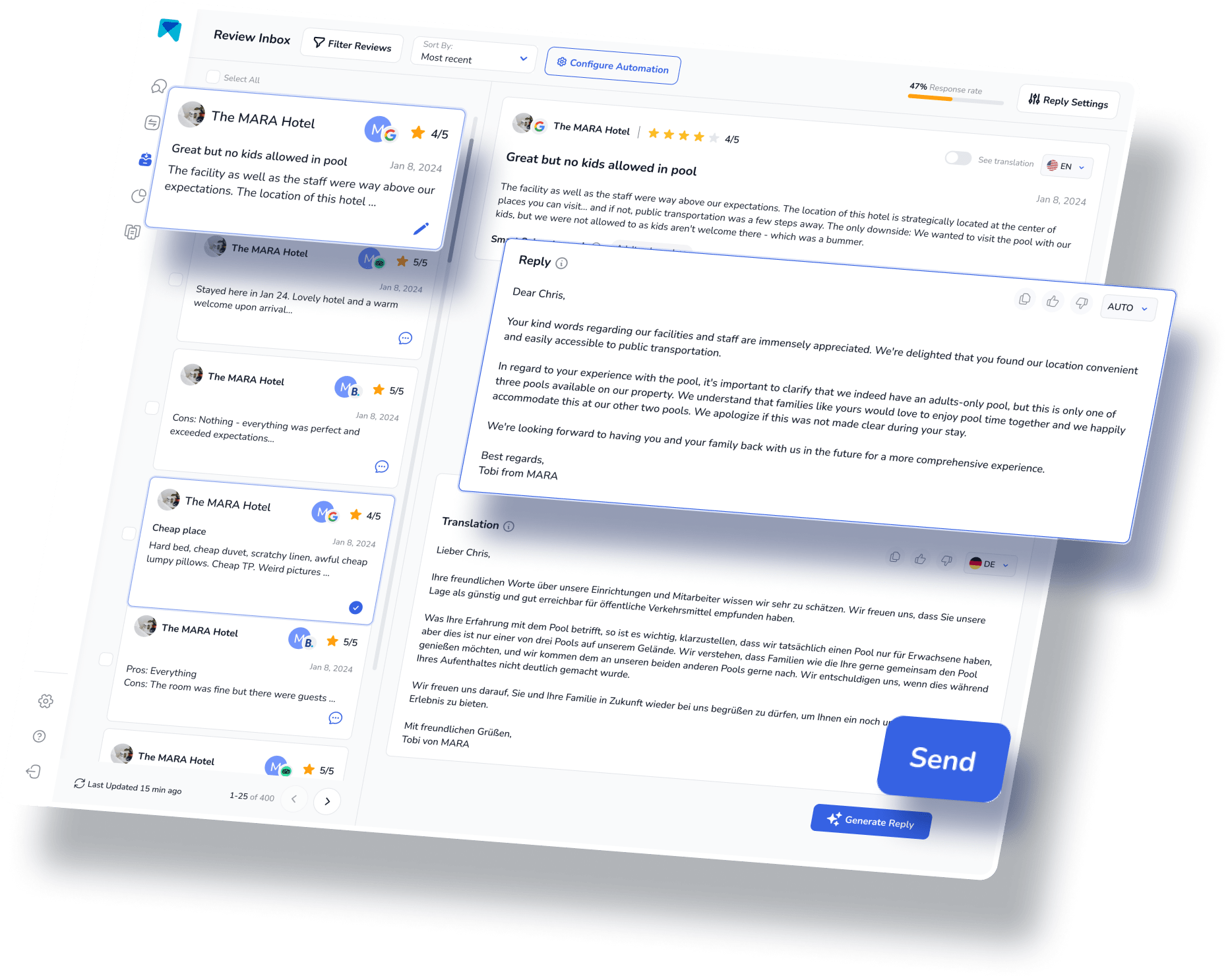
Advanced Review Analytics
To help you understand and analyze the multitude of reviews, the Review Assistant also incorporates Review Analytics. This provides actionable, easy-to-understand insights that are tailored exclusively to your business. With MARA, you can quickly get the gist of all your reviews without needing to read each one. The analysis is so detailed that you can find out about specific issues like "water in the pool is too cold" or "lack of vegan breakfast option”. These insights help optimize guest experience without requiring you to be a data expert.

The most personal response AI
MARA's AI isn't just about efficiency; it's about personalization too. The Brand Voice feature allows the AI to adapt to your tone, making sure your responses sound authentically you. Plus, with Smart Snippets, you can "teach" the AI how to respond to recurring praises or complaints. Your AI then incorporates this information into its responses, but always with different words, providing more personalized, relevant replies.
This review response assistant has quickly become a game-changer for over 2000 customers. Its promising capacity to elevate your overall rating, amplify response rates, glean insights from customer feedback and economize both time and money, is the reason behind its growing popularity.
2. Yext
Yext is a comprehensive digital presence platform designed to assist businesses in managing their online reputation effectively. One of its standout features is its centralized feedback management system, which allows businesses to monitor and respond to reviews from various online platforms, including Google, TripAdvisor, and Yelp, all from one dashboard. This streamlined approach enables hotels and restaurants to stay on top of guest feedback, ensuring prompt responses and swift action to address any concerns.

Additionally, Yext offers personalized response capabilities, allowing businesses to craft customized responses to guest reviews that reflect their unique brand voice and values. This personalized touch helps strengthen customer relationships and reinforces the brand's commitment to exceptional service. Moreover, Yext's review generation feature enables businesses to actively solicit authentic reviews from satisfied guests, bolstering their online reputation and credibility.
Despite its strengths, Yext's complex interface may pose challenges for some users, particularly those without extensive technical expertise. Navigating through the platform's dashboard and interpreting the data presented may require a learning curve, potentially impacting the efficiency of engagement and response management.
3. Customer Alliance
Customer Alliance specializes in online reputation management and guest feedback, providing analytics and review monitoring capabilities tailored for the hospitality industry. Their platform empowers hotels to efficiently monitor their online reputation and implement strategies to enhance guest satisfaction. Notably, Customer Alliance seamlessly integrates guest reviews into hotel websites through customizable widgets, showcasing vital information such as satisfaction ratings and review counts. This integration guides website visitors towards direct bookings, reducing reliance on third-party platforms and maximizing revenue opportunities.

However, users have reported occasional glitches, particularly after updates, which may temporarily disrupt platform functionality. Additionally, some users have encountered challenges with integration and data entry processes, highlighting areas for improvement in user experience and system compatibility.
Which tool can assist in evaluating your online reputation?
MARA AI offers comprehensive insights into your online reputation through its Review Analytics. With this feature, businesses can delve deep into customer feedback, identifying trends, sentiments, and specific issues mentioned in reviews. This tool empowers businesses to gain valuable insights that can guide decision-making and enhance overall reputation management strategies.
What is the optimal reputation management software for small businesses?
MARA AI is the optimal choice for small businesses, primarily because it is designed to save time. In addition, it is simple and ease to use and set up. You can even start a free trial of the whole software with no credit card required in less than five minutes. Furthermore, MARA AI's features are robust and tailored to meet the specific needs of small businesses, including review management, sentiment analysis, and response automation.
Final Thought
Harnessing a robust reputation management system can significantly transform your online presence, attract new customers, and boost your conversion rates. By carefully selecting and implementing the right tools, businesses can ensure a positive online reputation and sustained success in today's digital landscape.
This article is part of our hero content on “Online Reputation Management for Hotels".
Frequently Asked Questions:
Reputation management is measured using metrics such as mention rate, sentiment analysis, and influence of reach. These metrics help gauge brand visibility, customer sentiment, and the impact of online mentions.
To check a company's online reputation, search for the brand on review sites and search engines. Use tools like Google Alerts and online reputation management software to monitor mentions and reviews.
Monitor brand reputation online by using reputation management tools that track mentions, reviews, and listing activity. Regularly review and respond to customer feedback and set up alerts for new mentions.
A good online reputation score varies by platform but generally indicates a high level of positive feedback and customer satisfaction. Aim for a high rating on review sites and positive sentiment in online mentions.
Some of the best online reputation management tools include MARA AI, Yext, and Revinate. These tools offer features like review monitoring, sentiment analysis, and automated responses.



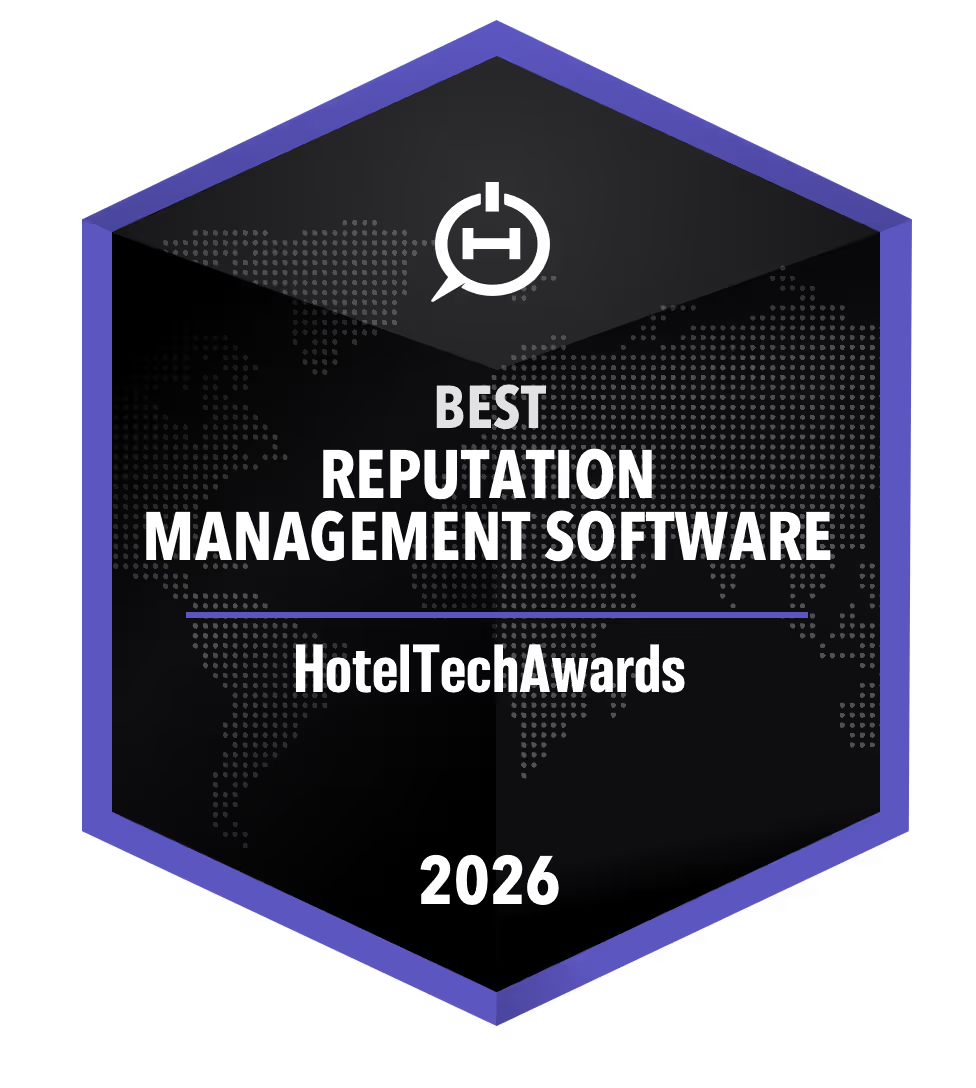

































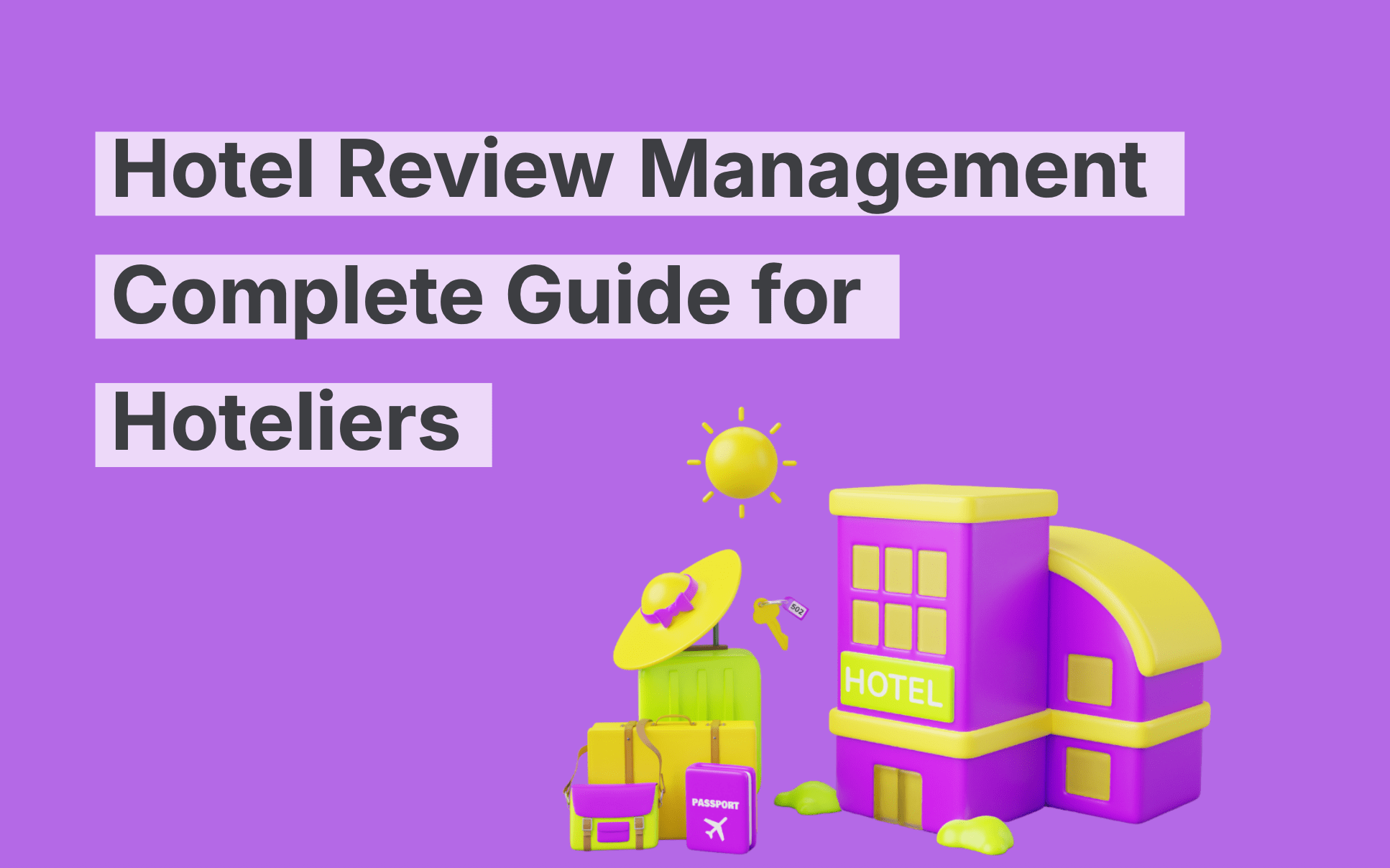
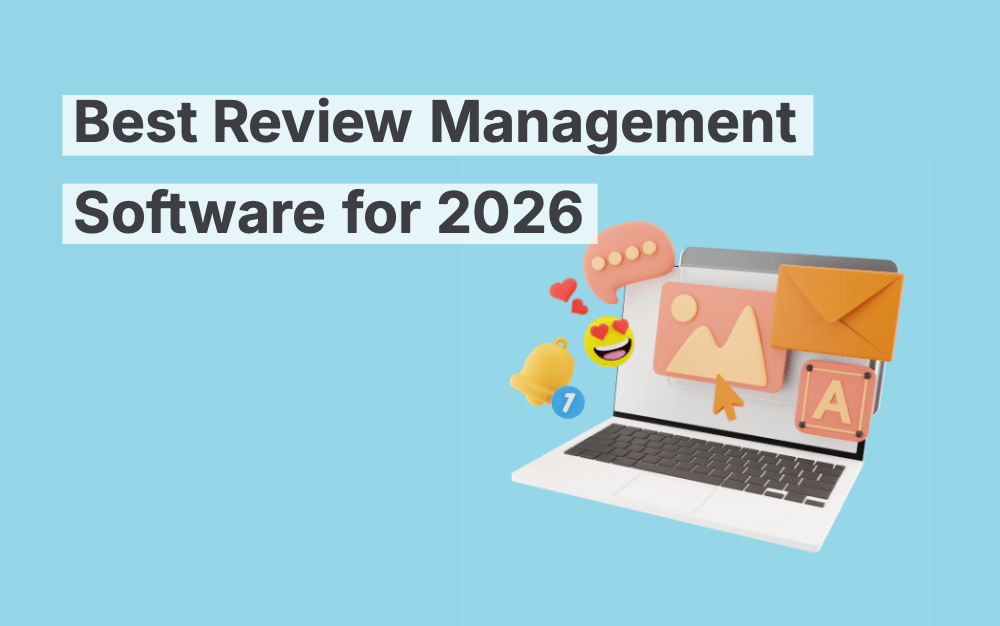
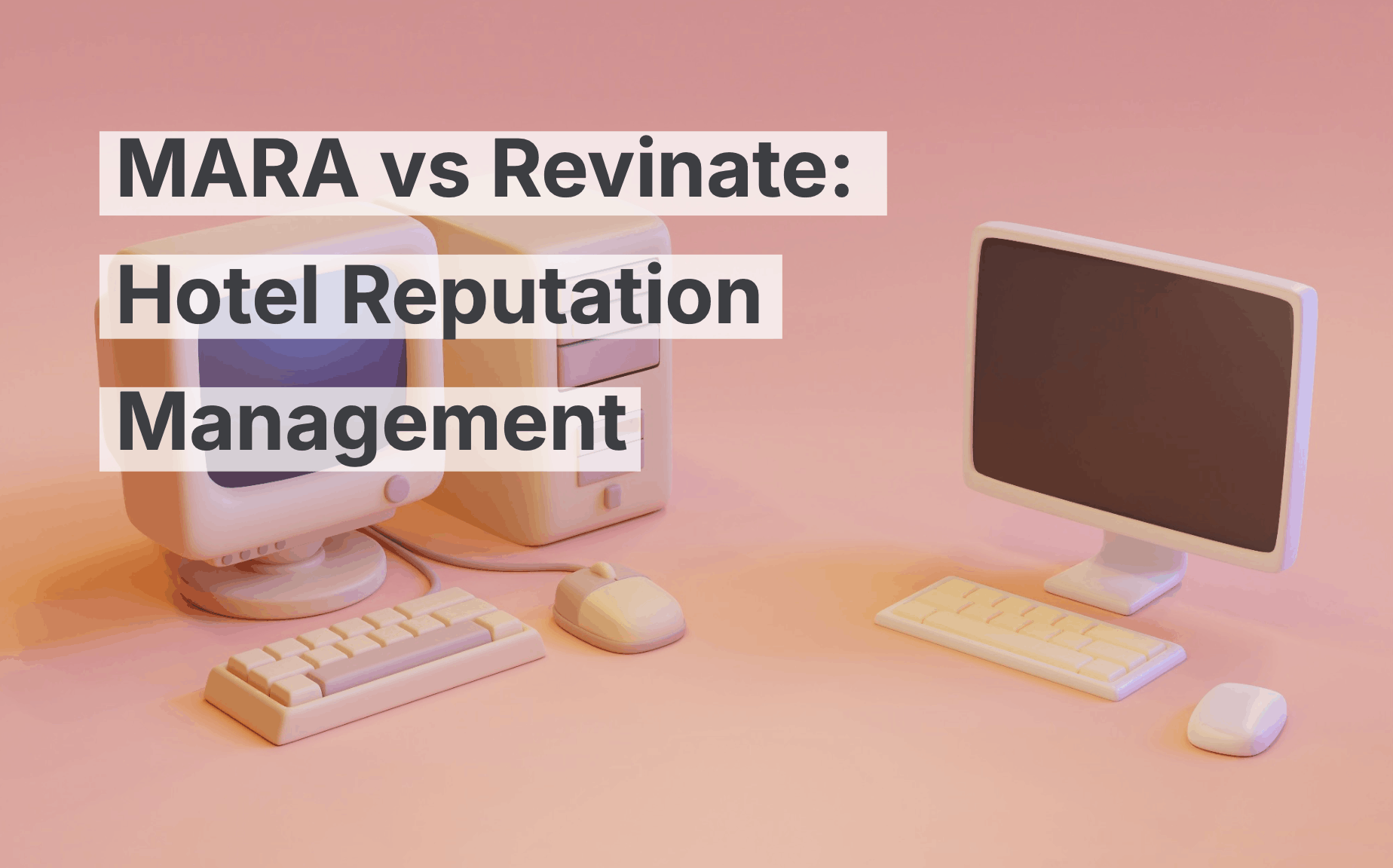
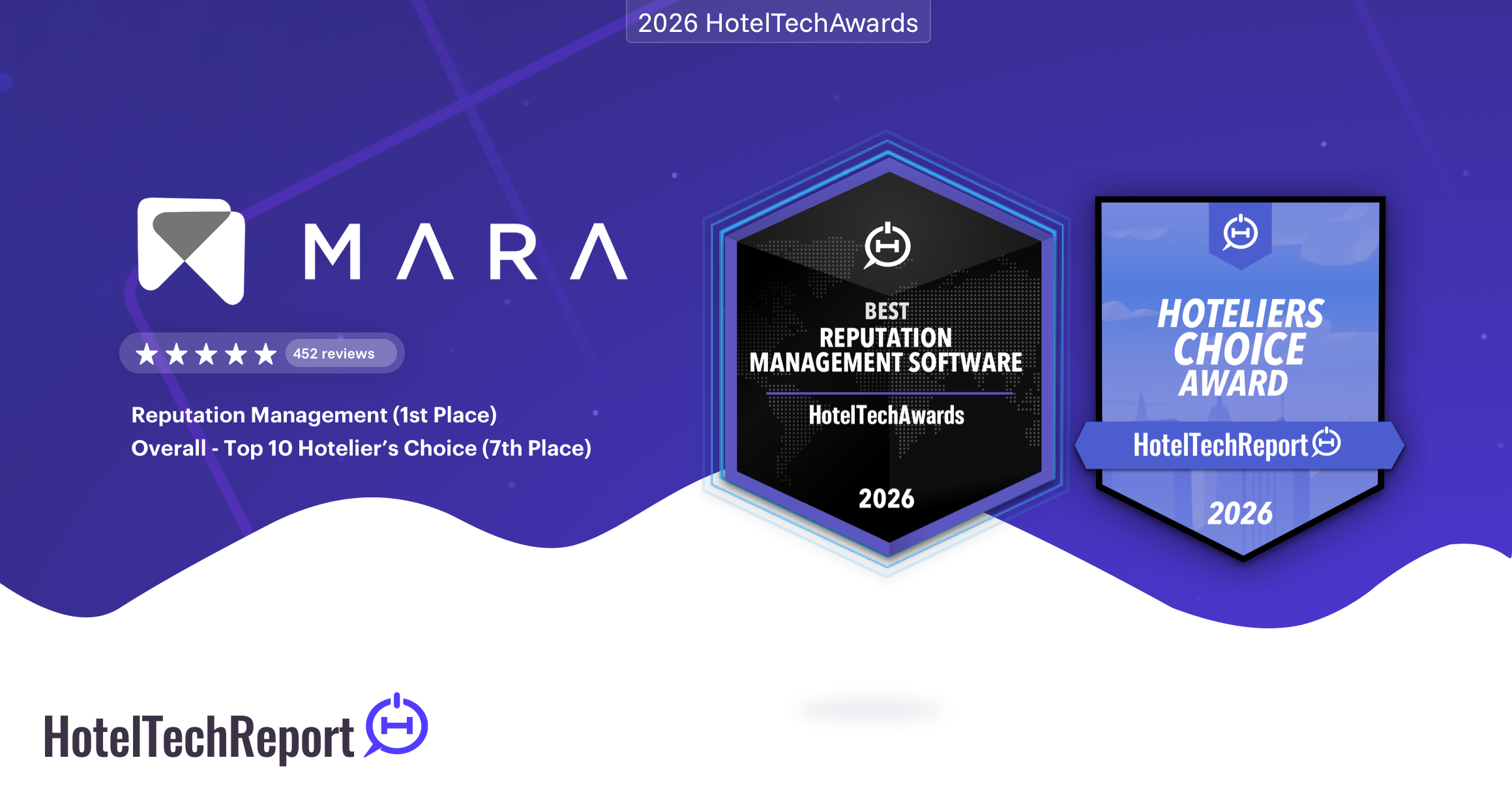





-min.avif)
